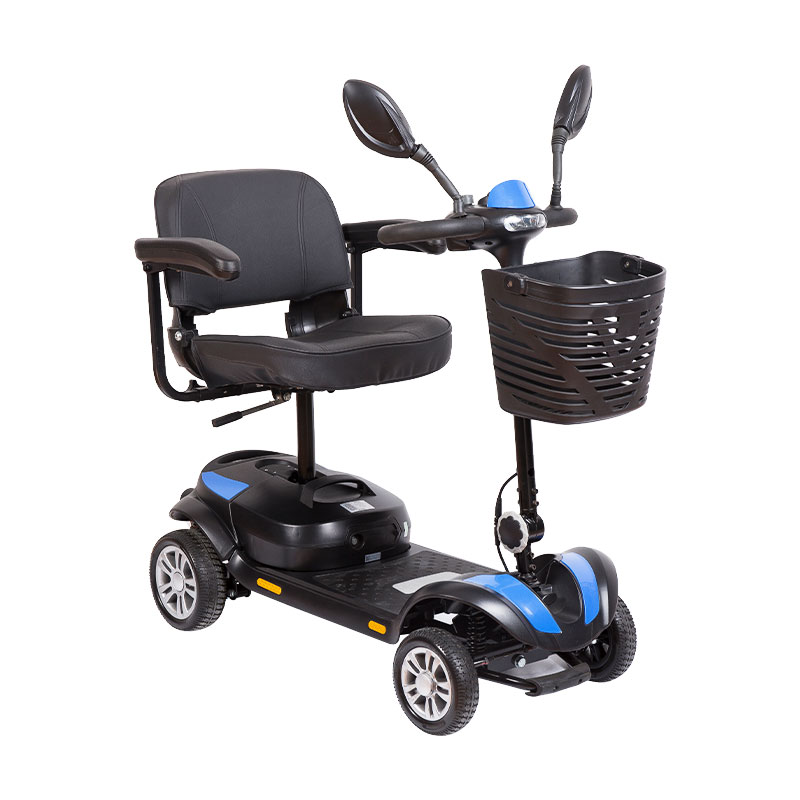Why is impact resistance important in the design of 4 wheels elderly mobility scooters panels?
Impact resistance is a crucial factor in the design of 4-wheel elderly mobility scooter panels for several reasons. These scooters are designed to enhance the mobility and independence of elderly users, and their construction must prioritize durability, safety, and user comfort. Let’s explore why impact resistance matters so much:
1. Protection from Bumps and Collisions
Daily Use in Various Environments: Elderly mobility scooters are often used in environments where they may encounter obstacles, such as curbs, walls, furniture, or uneven terrain. The scooter’s panels are the outermost part of the vehicle, so they are exposed to potential impacts from accidental bumps and minor collisions. Impact-resistant materials, such as polycarbonate or high-strength plastic, help protect the scooter’s internal components (like electronics and the motor) from damage.
User Safety: Impact-resistant panels reduce the risk of damage that could compromise the scooter’s structure or cause parts to break off, which could create hazards for the user. Panels that can absorb impact help maintain the overall integrity of the scooter, ensuring that it remains safe and reliable for extended use.
2. Durability and Longevity
Long-Term Use: Mobility scooters are often a long-term investment for elderly individuals, so the durability of the scooter is vital. Panels that are impact-resistant are less likely to crack, dent, or break under stress, allowing the scooter to withstand wear and tear over time. This not only extends the scooter’s lifespan but also reduces the need for frequent repairs or replacement parts, saving the user money in the long run.
Weather Resistance: Mobility scooters are frequently used outdoors, where they are exposed to various environmental conditions such as rain, heat, and even accidental drops. Impact-resistant materials are typically more durable against such elements, which further contributes to the longevity of the scooter.
3. Improved Aesthetics and Appearance
Maintaining the Scooter’s Look: Mobility scooters are personal items, and users often want them to look good for as long as possible. Impact-resistant panels help prevent unsightly scratches, dents, and other cosmetic damage. Polycarbonate materials, in particular, are known for their ability to resist deformation and maintain their appearance even after impacts.
User Confidence: A scooter that looks well-maintained and free from damage can improve the user’s confidence and sense of independence. Elderly individuals who rely on their mobility scooter for daily tasks may feel more self-assured if their scooter remains in good condition, both functionally and aesthetically.

4. Weight Efficiency
Lightweight but Strong: Modern mobility scooters prioritize being lightweight for ease of transport and battery efficiency. Impact-resistant plastics and polycarbonates offer the ideal combination of being lightweight while still providing strong protection. This allows the scooter to be both portable and durable without compromising on the ability to absorb and withstand impacts.
5. Protection of Internal Components
Shielding Sensitive Electronics: The panels of a mobility scooter act as a protective shell for the vital internal components, such as the motor, battery, and control systems. Impact resistance ensures that, in the event of a collision, these essential parts are protected from damage, preventing potential breakdowns or malfunctions that could leave the user stranded or compromise their safety.
Maintaining Scooter Functionality: If the panels are not impact-resistant, even minor bumps could cause structural damage that affects the scooter’s performance. A cracked panel could expose internal wiring or batteries to moisture or debris, potentially leading to mechanical failures. Impact-resistant materials prevent such issues, ensuring the scooter continues to function optimally.
6. Compliance with Safety Standards
Meeting Industry Standards: Manufacturers must adhere to strict safety regulations when designing mobility scooters, and impact resistance is an important part of this compliance. Panels made from impact-resistant materials help the scooter meet these safety standards, ensuring that the product is safe and reliable for elderly users, who are often more vulnerable to injuries from falls or accidents.
Impact resistance in the panels of 4-wheel elderly mobility scooters is essential for protecting both the user and the scooter itself. By using durable materials like polycarbonate and high-strength plastics, manufacturers ensure that the scooter can withstand everyday bumps, collisions, and environmental challenges. This not only extends the scooter’s lifespan and keeps it looking good but also ensures that the user remains safe and confident while navigating their surroundings. In short, impact resistance is a key feature that enhances both the performance and reliability of mobility scooters.


 English
English Deutsch
Deutsch







-3.jpg?imageView2/2/format/jp2)
.jpg?imageView2/2/format/jp2)






